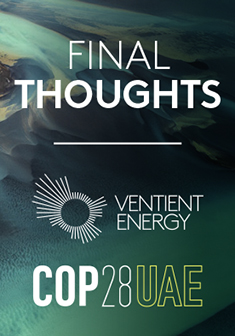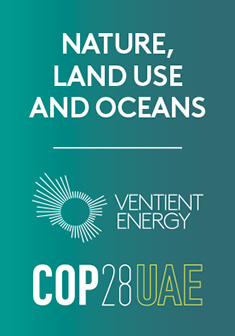“The international financial architecture is short-sighted, crisis-prone, and bears no relation to the economic reality of today”, said UN Secretary-General António Guterres. This outlook would be concerning at the best of times, not least when we are staring into the face of a climate crisis which threatens the very foundations of our already broken system.
Studies show that unchecked climate change will significantly reduce global economic output, the costs of which will disproportionally effect women, girls, and marginalised groups in developing economies who are most exposed to climate risks and vulnerable to financial impacts. To make matters worse, the international financial and trade systems of today are poorly designed to channel resources towards global climate goals, and they are inaccessible to a large proportion of the world’s population.
Day 2 needs to deliver
Urgent action is needed to reform these systems, meaning that there is a lot riding on the second thematic day of COP28 – centred around Finance, Trade, Gender Equality and Accountability. Delegates will debate how the international financial and trade systems should be structured moving forward to achieve a gender-just climate transition. Crucially, the program also aims to establish accountability mechanisms to turn these ambitions into concrete action.
Finance: Showcasing a coherent and ambitious action agenda
One of the key challenges facing the international finance system is the presence of a systemic barrier preventing climate investment in developing economies. 52 developing countries are in (or at risk of) debt distress and are spending an estimated five times more on debt servicing than on climate critical infrastructure every year. The inability of these developing economies to access climate finance is not simply impacting those countries, but the whole world.
Last year, the UN Chief and Barbados Prime Minister called for urgent action to transform the broken international financial system, resulting in the launch of the Bridgetown Initiative 2.0. Six actions were proposed to improve access to climate finance for developing economies, including immediate liquidity support, debt restructuring through long-term lowering of interest rates, and mobilisation of private sector investment in the green economy.
As we’ve seen with the Bridgetown Initiative 2.0, the solutions are already on the table – but without concrete and urgent action, the finance system in its current form will make it impossible for the world to meet climate goals. COP28 should be seized as an opportunity to establish immediate relief for developing economies and put in motion longer-term restructuring of the financial system.
Trade: Elevating the potential of international trade as a lever in climate action
The second thematic day of COP28 also aims to address the complex interlinkages between climate change and international trade. Studies estimate that international trade is responsible for 20-30% of global carbon dioxide emissions – a very significant contribution towards rising greenhouse gas emissions. It is also one of the hardest parts of the economy to decarbonise, as global supply chains are notoriously complex and opaque.
At Ventient Energy, we are working hard to understand and reduce our scope 3 greenhouse gas emissions (those arising from our value chain) by engaging closely with our largest suppliers, new and existing, to access their emissions data and promote alignment with our decarbonisation ambitions.
While we are exerting positive influence to help decarbonise the renewable energy industry, we recognise that we are just one link in an incredibly complex supply chain. The key to achieving success is ensuring that every single link, across every single industry, is working towards the same goal. This task is far from easy, but it is hoped that COP28 will accelerate this goal by bringing about greater trade cooperation in both policymaking and the private sector.
Trade is a key part of the solution
The recent 2022 World Trade Report argued that trade can help with climate change adaptation through improving access to climate-resilient technologies for example drought-resistant crops or weather forecasting, as well as lowering the cost of climate mitigation by eliminating or reducing tariffs on certain environmental goods. Another key goal of COP28 will be uniting leaders to promote a roadmap of trade policy options to contribute to global efforts in combating climate change.
Gender Equality: Promoting a gender-just transition
Climate change impacts all of us, but not everyone is on the frontline. Paradoxically, the people whose livelihoods, health, and safety are on the frontline, are disproportionately ill-equipped with the financial resources and decision-making power to fight it. Women, ethnic minorities, and people living in poverty are forced to rely on leaders who do not represent them to make decisions that disproportionately affect them – this is not only unequal but ineffective.
It should go without saying that the people most impacted by climate change are the best advocates to fight it. Amplifying the voices of women and marginalised groups will lead to a more effective policy response. Not only this but increasing the flow of climate finance and green jobs to these people will accelerate climate action.
Inclusion will power the transition
As part of the green economy, we see value in having a diverse workforce in our day-to-day work. Ventient Energy is an equal opportunity employer, and we strive to create an inclusive environment where our employees can reach their full potential without prejudice and discrimination. We fully recognise that a more diverse group of people means a more diverse set of skills and experience.
While gains have been made across the public and private sectors to make climate-related decision-making, finance, and green jobs more accessible, there is still a long way to go. At COP27, less than 30% of the leadership delegation identified as a woman. Now is the time to shift the balance to place gender equality at the core of climate action and achieve a gender-just transition.
Accountability: Establishing accountability
The missing piece of the puzzle is accountability, which is the final topic of the day. In the context of climate change, accountability is the link between long-term climate goals and concrete action. It is generally achieved through having governance structures and processes in place that require responsible parties to report progress regularly and transparently. One of the key reasons why global progress on climate action has been worryingly slow is an accountability shortfall.
Accountability is fundamental to what we do at Ventient Energy. We are alarmed by the net zero ‘credibility gap’ in both the private and public sectors, manifesting in widespread disparity between net zero pledges and credible actions to achieve them. This year, we released a Net Zero Policy which stands in direct contrast to this approach.
We are boldly transparent about the fact that we are not able to set a net zero target at present, but we are doing everything possible to contribute to a net zero future and intend to set a net zero target aligned with best practice at the earliest point possible.
We are seeing more and more responsible parties pivoting towards greater accountability, but individual players can only do so much. Direction is needed from world leaders at COP28 to reinforce existing accountability measures and establish a foundation for greater accountability in climate action.
Conclusion
Finance, trade, gender equality, and accountability, are four fundamentally important sub-themes of COP28 which all call for urgent action. We will be eagerly following the proceedings of the day, hoping to see progress towards re-structuring international financial and trade systems and achieving a gender-just climate transition.
One of the key indicators of the success of COP28 can be found by watching the accountability sub-theme, which has been systematically undervalued in climate decision-making to date. Greater accountability is the missing link between long-term climate goals and concrete action, and is pivotal to the successful implementation of all COP28 decisions.
Sources:
https://www.wto.org/english/news_e/news21_e/clim_03nov21-4_e.pdf
https://www.scientificamerican.com/article/give-more-women-the-microphone-at-cop-27/


More articles


COP28 - What happened and was it a success?
Last week we saw COP28 come to a close, and, as President Sultan Ahmed Al Jaber dropped the final hammer of the conference, it’s fair to say there were some mixed emotions regarding the outcome. Over the last 8 weeks, we have been following…


Nature, Land Use & Oceans
We are facing an ecological “polycrisis” The 2023 Global Risk Report[i] published by the World Economic Forum warns that the world is hurtling towards an era of “polycrises”, meaning multiple interconnected crises happening at the same…


